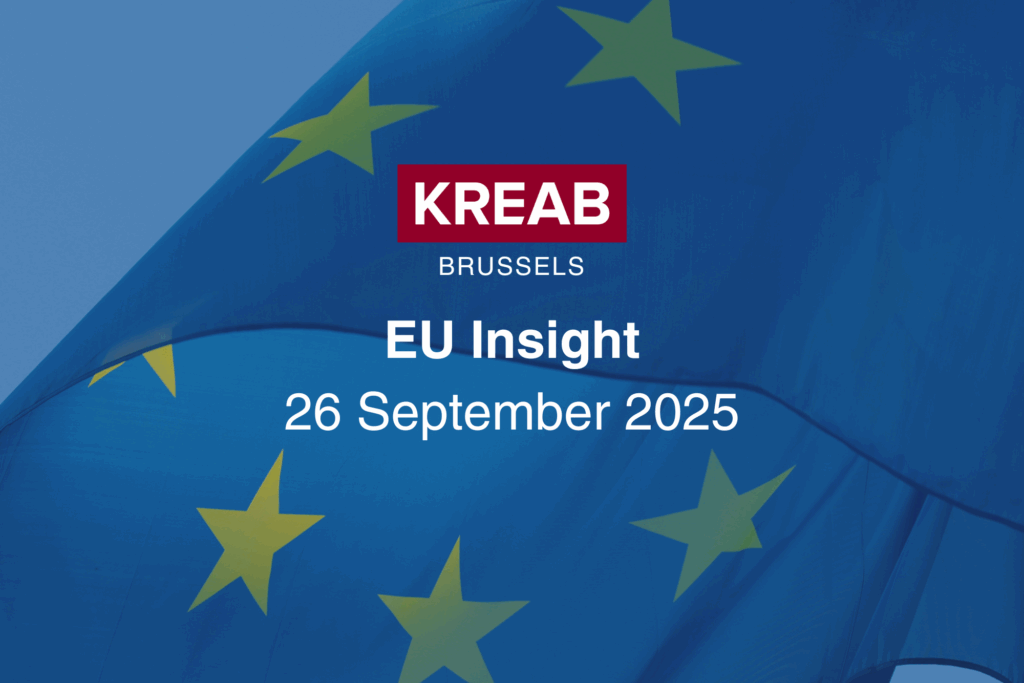
26/09/2025
EU Insight 26 September 2025
Brussels, 26 September 2025
EU PUSHES FOR CLIMATE ACTION AND TWO-STATE SOLUTION AT THE UN GENERAL ASSEMBLY
Amid tense geopolitical context, world leaders gathered in New York for the 80th United Nations General Assembly to take stock of current challenges, including climate action, human rights, ongoing wars in the world, and digitalisation. At the Climate Summit, Commission President von der Leyen underlined the EU’s commitment to achieve climate neutrality by 2050, its pledge to multilateralism, and the need for more climate financing. In the margins of the General Assembly, ten more countries, including several European Member States, recognised Palestine as an independent State, while von der Leyen called for a two-State solution between Palestine and Israel. Talks were also ongoing regarding the possible reimposition of UN sanctions against Iran, following the request by France, Germany and the United Kingdom this summer.
FINANCE MINISTERS MET TO DISCUSS SIMPLIFICATION, GEOPOLITICS & DIGITAL EURO PROJECT
Over the weekend, Finance Ministers met in Copenhagen for informal Eurogroup and ECOFIN discussions. Most notably, Member States agreed on the process for setting the ceiling for holding limits and issuance of the digital euro, amid repetitive calls by the Commission and European Central Bank to urgently advance the negotiations on the file. In addition, ministers held strategic talks on geopolitics, with a view to build a strong European economy that features strategic autonomy and strong defence. Sessions also focused on economic consequences of EU regulation and how to further simplify financial regulation, as well as on ways national structural reforms can strengthen productivity and competitiveness.
EU AND INDONESIA FINALISE NEGOTIATIONS ON COMPREHENSIVE ECONOMIC PARTNERSHIP
After almost 10 years of negotiations, the EU and Indonesia jointly announced the conclusion of an economic partnership agreement. As part of the Commission’s current trade agenda, the deal aims to diversify trade partnerships, notably by securing new opportunities for EU companies, bringing benefits for farmers and securing sustainable critical raw materials supply. The new agreement will remove 98.5% of Indonesian tariffs on EU goods, while Indonesia’s main export goods, such as palm oil, textiles and footwear, will benefit from EU preferential market access. Member States now need to adopt the agreement, and MEPs must give their consent, before the EU and Indonesia can finally ratify the legal text.
COMMISSION DEFERS DEFORESTATION RULES, MEPs REJECT FOREST MONITORING FRAMEWORK
This week, the Commission proposed a further one-year postponement of the Deforestation Regulation, which was due to take effect on 30 December 2025. Commissioner Roswall cited technical limitations with the information system as the main reason for the delay. She also declared that the decision was not prompted by US concerns raised during recent tariffs talks, nor by the newly concluded free trade agreement with Indonesia. With the legislative process now set to reopen, both Parliament and Council may suggest further modifications, including the possible introduction of a zero-risk category with lighter requirements for European farmers and foresters. In parallel, the Parliament’s Agriculture and Environment Committees rejected the Commission’s proposed EU forest monitoring law, a decision that will have to be confirmed during the next plenary.
AGRI COMMITTEE VOTES ON SIMPLIFYING EU COMMON AGRICULTURAL POLICY
Parliament’s Agriculture Committee adopted its position on the simplification of the EU common agricultural policy (CAP) as part of the Commission’s series of Omnibus proposals. The proposal aims to alleviate excessive administrative reporting and regulatory burdens on farmers and other agri-food sectors. MEPs called for more flexibility for farmers in complying with the CAP’s environmental rules, redirect crisis payments to rural development funds, and raise support for small farmers up to €5,000 annually with a new one-off payment for business development up to €75,000. The newly adopted report is scheduled for a plenary vote early October, after which talks with Member States will begin in the view of a final adoption at the November plenary.
COMING UP NEXT WEEK
-
29-30 September: Competitiveness Council. On the agenda: European Competitiveness Fund, Simplification, Single Market Strategy, Startup and Scaleup Strategy, Horizon Europe Package.
-
30 September: College of Commissioners. On the agenda: Savings and Investment Union package.
-
1 October: Informal meeting of heads of State or Government. On the agenda: Security and defence, support for Ukraine.
-
2 October: Meeting of the European Political Community.

Did you like this article? Contact us to hear more about Kreab Brussels’ practice and services.

